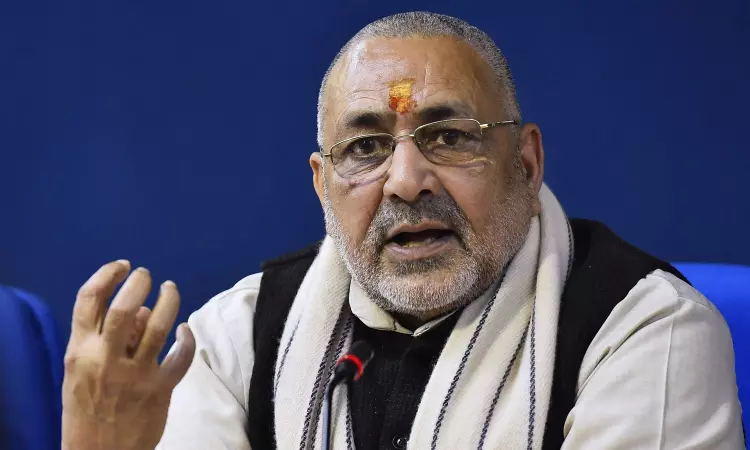Considering PLI scheme for garments sector: Textiles Minister
The government approved the PLI scheme for textiles with an approved outlay of Rs 10,683 crore over a five year period to promote production of MMF (man-made fibre) Apparel.

Union Minister Giriraj Singh (PTI)
NEW DELHI: Textiles Minister Giriraj Singh on Tuesday said the government has approved over Rs 10,000 crore production linked incentive (PLI) scheme for textiles and now considering to extend it to the garments sector with a view to boosting domestic manufacturing and exports. Addressing the India International Garment Fair (IIGF) here, Singh said that huge opportunities are there to increase exports and the industry should target USD 50 billion worth of shipments in the coming years.
In 2021, the government approved the PLI scheme for textiles with an approved outlay of Rs 10,683 crore over a five year period to promote production of MMF (man-made fibre) Apparel, MMF Fabrics and Products of Technical Textiles in the country to enable textiles industry to achieve size and scale and to become competitive.
"We are considering to cover your (garments) sector also (under the scheme)," Singh said.
He added that the market size of the Indian textiles industry is about USD 165 billion and "we have to take it to USD 350 billion".
He said that the ministry is framing a roadmap to move ahead of China in the sector.
The minister suggested the industry to follow 'hub and spoke' model to boost domestic manufacturing. -
"I appeal to big industry players to engage with small players in India," he said adding the ministry will hold meetings with big players to understand their issues.
Bangladesh and China are the biggest competitors of Indian industry in the sector.
He also called for exploring opportunities to increase exports through e-commerce medium.
Last year, the cross-border e-commerce trade was about USD 800 billion and it is estimated to reach USD 2 trillion by 2030.
Further, the minister suggested the industry establish their own brands instead of becoming suppliers to global brands, besides focusing on green textiles and recycling.
The ministry is also looking at reviving Scheme for Integrated Textile Parks (SITP).
The scheme aims to create new parks of international standards. Under the scheme 54 textile parks were sanctioned.
Speaking at the fair, Apparel Export Promotion Council (AEPC) Chairman Sudhir Sekhri said the global headwinds negatively affected Indian apparel exports, despite that Indian apparel export industry was able to hold its own and contain the damage to quite an extent.
AEPC Secretary General Mithileshwar Thakur said that the world economy is expected to register healthy growth and global inflation will also decline steadily, and this indicates that there is a greater chance for Indian apparel exporters to expand its footprint across developed countries in the coming years.
"Indian apparel industry must encash this opportunity and start dreaming big," Thakur added.
Gurgaon-based garment firm Cocoon Kapas owner Meenakshi said that huge export opportunities are there for Indian textiles in the global market.
"We are working on natural fibres and there is a healthy demand for our product in countries such as the US and Japan," she said, adding that her firm is getting "good orders from developed countries".



